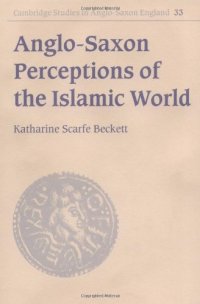
Ebook: Anglo-Saxon Perceptions of the Islamic World (Cambridge Studies in Anglo-Saxon England)
Author: Katharine Scarfe Beckett
- Series: Cambridge Studies in Anglo-Saxon England
- Year: 2003
- Publisher: Cambridge University Press
- Language: English
- djvu
Beckett studies the nearly five centuries from the rise of an Islamic policy (A.D. 622) to the first Crusade (A.D. 1096), looking in detail at the wisps and traces of English knowledge of, contact with, and attitudes toward Muslims. The results are highly interesting.
Who knew that Bishop Georgius of Ostia, a papal legate to England, reported in 786 to the pope on two synods he had attended and included this decree: "That no ecclesiastic shall dare to consume foodstuffs in secret, unless on account of very great illness, since it is hypocrisy and a Saracen practice"? Or that Offa, the king of Mercia (a region of the Midlands, north of London) during the years 757-96 had a gold piece struck in his name, now available for view at the British Museum, which bore, as Beckett puts it, "a somewhat bungled Arabic inscription on obverse and reverse in imitation of an Islamic dinar"?
In fleshing out Dark Ages' reactions to the new faith, Beckett very usefully establishes the primitive base from which the English-speaking peoples even today ultimately draw their views. She tells about the unique English traveler's account to the Middle East dating from this era (that of Arculf); tallies the dinars found in such places as Eastborne, St. Leonards-on-Sea, London, Oxford, Croydon, and Bridgnorth; and totes up the Middle Eastern imports, such as pepper, incense, and bronze bowls. She finds that a "continuing network of trade and diplomatic links" connected western Christendom to the Muslim countries.
As for attitudes, they were not just uninformed but static. Beckett notes that initial responses to Islam were shaped by pre-Islamic writings, especially those of St. Jerome (c. A.D. 340-420), on Arabs, Saracens, Ismaelites, and other easterners. This prolonged influence resulted from a pronounced lack of curiosity on the part of Anglo-Saxons and most other Europeans.
To end on a jarringly contemporary note: dismayingly, the influence of Edward Said has reached the point that his theories about Western views of Muslims now reach even to the early medieval period; Beckett devotes page after page to dealing with his theories. Happily, she has the confidence and integrity (in her words) "to some extent" to dispute those theories.
Daniel Pipes
Who knew that Bishop Georgius of Ostia, a papal legate to England, reported in 786 to the pope on two synods he had attended and included this decree: "That no ecclesiastic shall dare to consume foodstuffs in secret, unless on account of very great illness, since it is hypocrisy and a Saracen practice"? Or that Offa, the king of Mercia (a region of the Midlands, north of London) during the years 757-96 had a gold piece struck in his name, now available for view at the British Museum, which bore, as Beckett puts it, "a somewhat bungled Arabic inscription on obverse and reverse in imitation of an Islamic dinar"?
In fleshing out Dark Ages' reactions to the new faith, Beckett very usefully establishes the primitive base from which the English-speaking peoples even today ultimately draw their views. She tells about the unique English traveler's account to the Middle East dating from this era (that of Arculf); tallies the dinars found in such places as Eastborne, St. Leonards-on-Sea, London, Oxford, Croydon, and Bridgnorth; and totes up the Middle Eastern imports, such as pepper, incense, and bronze bowls. She finds that a "continuing network of trade and diplomatic links" connected western Christendom to the Muslim countries.
As for attitudes, they were not just uninformed but static. Beckett notes that initial responses to Islam were shaped by pre-Islamic writings, especially those of St. Jerome (c. A.D. 340-420), on Arabs, Saracens, Ismaelites, and other easterners. This prolonged influence resulted from a pronounced lack of curiosity on the part of Anglo-Saxons and most other Europeans.
To end on a jarringly contemporary note: dismayingly, the influence of Edward Said has reached the point that his theories about Western views of Muslims now reach even to the early medieval period; Beckett devotes page after page to dealing with his theories. Happily, she has the confidence and integrity (in her words) "to some extent" to dispute those theories.
Daniel Pipes
Download the book Anglo-Saxon Perceptions of the Islamic World (Cambridge Studies in Anglo-Saxon England) for free or read online
Continue reading on any device:

Last viewed books
Related books
{related-news}
Comments (0)